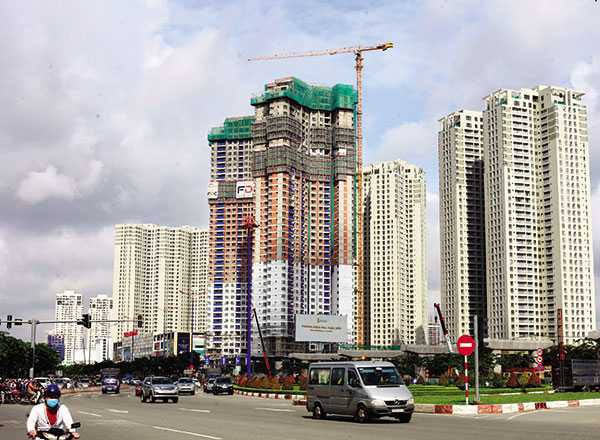Property rakes in second-highest FDI
 |
| The Japanese entry to the local realty landscape has helped boost FDI in the sector Photo: Le Toan |
According to recent statistics published by the Ministry of Planning and Investment, the property sector was behind the manufacturing and processing sector, which has so far accrued a total of $12.84 billion in 842 newly-registered and 691 capital-added projects, equaling 72.9 per cent of the total foreign direct investment (FDI) inflow to Vietnam.
Some notable investments by foreign investors include the $226 million real estate project named Midtown by Cayman Islands and the $6 billion Saigon Peninsula project by Pavilion Group, Genting Malaysia Berhad, and Vietnamese partner Van Thinh Phat. There is also the complex of port and industrial zones in the north-eastern province of Quang Ninh with the investment capital of over $315 million. Moreover, Amata Long Thanh will earmark $309 million to build up an urban development project in the southern province of Dong Nai.
In addition to the usual South Korean and Singaporean investors, the Japanese are emerging with a range of projects.
Japan’s Meade Group, the contractor of the Ho Chi Minh City Metro Line’s Ben Thanh-Suoi Tien stretch, just started work on a $30 million high-end real estate project in Ho Chi Minh City’s District 2, called Wateria Suites.
Previous to that, Daiwa House Industry, Nomura Real Estate Development, and Sumitomo Forestry were awarded an investment certificate to develop a $220 million condominium project in Ho Chi Minh City’s District 7.
And then there are the big players. Kajima Corporation joined with Indochina Land for a range of property projects with the total investment of around $1 billion in the next ten years. Mitsubishi Estate, another famous Japanese property developer, recently diversified its portfolio in Vietnam by buying into a property development project in Hanoi, with the total investment of $1.9 billion.
According to Yakabe Yoshinori, Deputy Consul General of Japan in Ho Chi Minh City, with the increase in the middle- and high-income classes, the supply of safe and secure housing is becoming an urgent issue.
“The real estate sector is becoming very attractive to foreigners as well, with revised housing regulations since July of last year which allow foreigners to own houses in Vietnam,” Yoshinori said, at a recent signing ceremony for Ho Chi Minh City’s Kikyo real estate complex. The project is a joint venture between domestic Nam Long Investment Corporation and two Japanese partners, Nishi Nippon Railroad and Hankyu Realty.
Japanese investors prefer to acquire projects which have completed investment procedures and are coming into the construction phase, rather than joining them from the beginning. They have shown a
special preference for projects which are coming into operation and starting the turnover collection period.
What the stars mean:
★ Poor ★ ★ Promising ★★★ Good ★★★★ Very good ★★★★★ Exceptional
Latest News
More News
- Dong Nai experiences shifting expectations and new industrial cycle (January 28, 2026 | 09:00)
- An Phat 5 Industrial Park targets ESG-driven investors in Hai Phong (January 26, 2026 | 08:30)
- Decree opens incentives for green urban development (January 24, 2026 | 11:18)
- Public investment is reshaping real estate’s role in Vietnam (January 21, 2026 | 10:04)
- Ho Chi Minh City seeks investor to revive Binh Quoi–Thanh Da project (January 19, 2026 | 11:58)
- Sun Group launches construction of Rach Chiec sports complex (January 16, 2026 | 16:17)
- CEO Group breaks ground on first industrial park in Haiphong Free Trade Zone (January 15, 2026 | 15:47)
- BRIGHTPARK Entertainment Complex opens in Ninh Binh (January 12, 2026 | 14:27)
- Ho Chi Minh City's industrial parks top $5.3 billion investment in 2025 (January 06, 2026 | 08:38)
- Why Vietnam must build a global strategy for its construction industry (December 31, 2025 | 18:57)

















 Mobile Version
Mobile Version